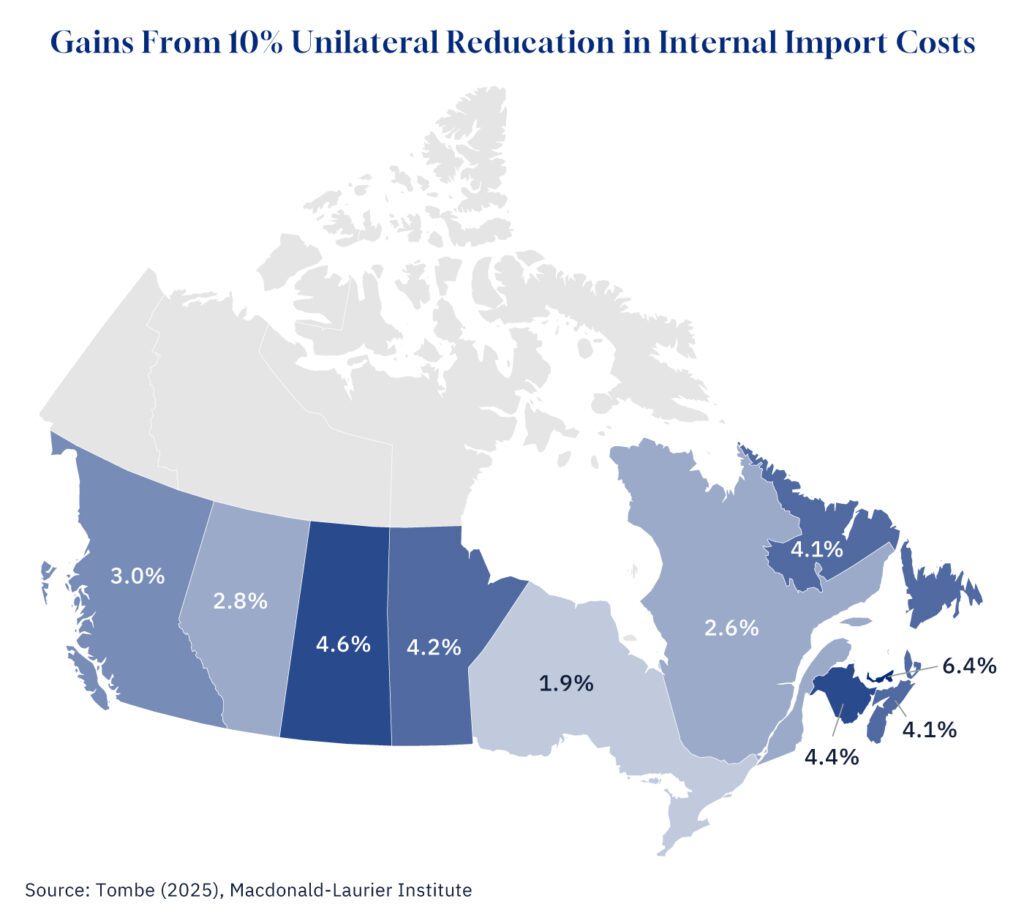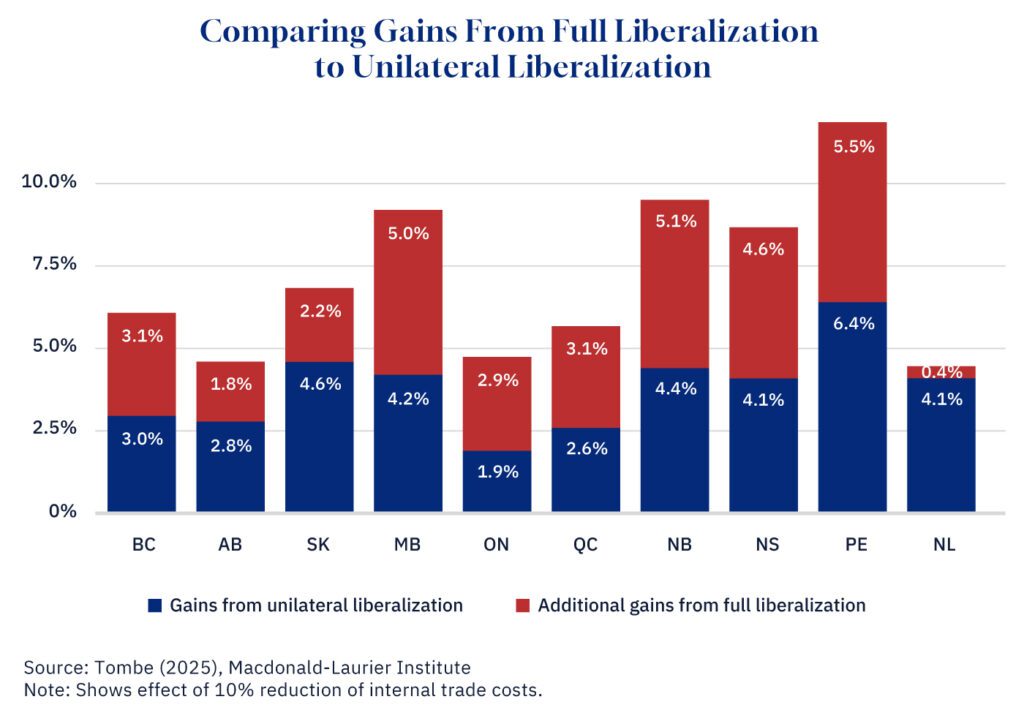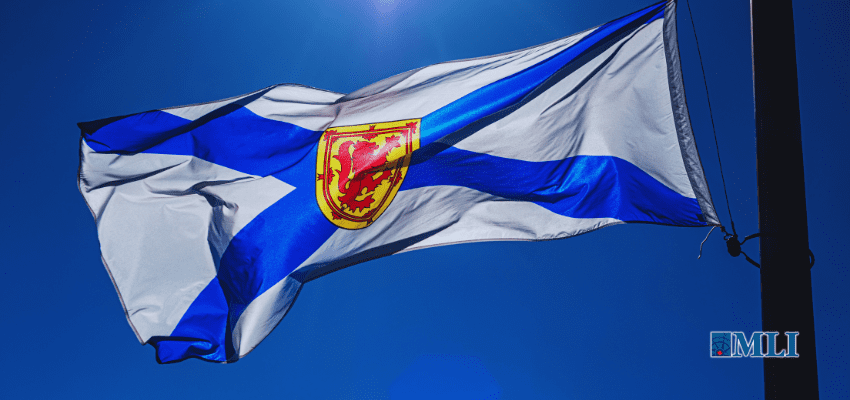This article originally appeared in The Hub.
By Trevor Tombe, March 20, 2025
Internal trade has long been a challenge in Canada. As a highly decentralized country, provinces have significant control over regulations affecting economic exchange and labour mobility. That’s a feature for a country as diverse as we are.
But it’s also a bug.
Simply put: the rules vary from one province to another, creating barriers that impact both individuals and businesses. Whether it’s someone looking to buy goods from another province, a professional trying to work in a new jurisdiction, or a business seeking to expand across provincial boundaries, these inconsistencies add both costs and complications.
Take trucking, for example. Regulations around tires, brakes, and weight limits differ across provinces. A trucker driving between jurisdictions must comply with multiple sets of rules, leading to delays and increased costs.
With a potential trade war between Canada and the U.S. looming, internal trade liberalization could boost the country’s productivity and resilience in the face of external disruption. Research by myself and Ryan Manucha published by the Macdonald-Laurier Institute suggests that reducing interprovincial trade barriers could increase Canada’s productivity by 4.4 percent to 7.9 percent—a far greater impact than the estimated cost of a trade war with the U.S.
Progress has been unfortunately difficult.
A path forward: provinces can act alone
It doesn’t have to be this way. Provinces stand to gain significantly from reducing trade barriers, even if they act unilaterally. In another recent study for the Macdonald-Laurier Institute, released only a few weeks ago (with webinar here), I found that provincial governments could unlock substantial economic benefits by allowing goods, services, and workers from other provinces to enter their markets without additional licensing or regulatory requirements.
While full nationwide liberalization would yield the highest economic benefits, provinces moving independently could still capture most of the gains. For example, a 10 percent reduction in internal import barriers could lead to real GDP increases ranging from 2 percent in Ontario to over 6 percent in Prince Edward Island. On average, for every 1 percent reduction in import costs, a province’s GDP could rise by approximately 0.3 percent—a massive economic boost.

Even if all provinces do not act together, unilateral action can still deliver a significant share of potential benefits. Alberta, for instance, could realize 60 percent of the possible economic gains from full national liberalization on its own. British Columbia could capture half, Saskatchewan about two-thirds, and Newfoundland and Labrador over 90 percent.

The political challenge
Despite the clear economic benefits, internal trade liberalization remains politically difficult. It requires provinces to give up some regulatory autonomy, harmonizing with or deferring to the standards of other jurisdictions. For governments that prioritize provincial independence—such as Alberta and Quebec—this is a tough sell. Moreover, premiers often focus on more immediate political priorities, keeping internal trade reform low on the agenda.
There are also vested interests within provinces that may resist reform. However, if at least one other province reciprocates, the political hurdles become easier to overcome. A smaller coalition of two, three, or four provinces agreeing to mutual market access could be more achievable than a nationwide deal involving all 13 governments.
Nova Scotia’s bold move
Enter Nova Scotia Premier Tim Houston.
His government hopes to change the game with its Free Trade and Mobility Within Canada Act. The act’s purpose is clear: “to remove all barriers to trade in goods, services and investment between the provinces and territories of Canada.”
The bill is straightforward. It states that for any province or territory that reciprocates with similar measures, Nova Scotia will eliminate all exceptions it currently applies under the Canadian Free Trade Agreement. It also ensures that “goods manufactured or produced in a reciprocating province or territory that have met the requisite standards and approvals of that jurisdiction shall be treated as if those goods were manufactured or produced in [Nova Scotia] and shall not be subject to any additional fees or testing…”
But it doesn’t stop there.
The bill extends to service providers, stating that anyone licensed in a reciprocating province will be recognized as licensed in Nova Scotia without extra requirements. Given that roughly 60 percent of interprovincial trade in Canada involves services rather than goods, this change is particularly significant.
The legislation also directs all Nova Scotia licensing authorities—of which there are hundreds nationwide—to waive registration or licensing requirements for businesses already registered or licensed in a reciprocating province. This would not only make it easier to trade goods and services but also facilitate labour mobility across the country.
It’s hard to overstate the significance of this move. With a single act, the province would wipe away most of the underlying frictions that inhibit interprovincial trade. No province has ever proposed anything remotely close to this level of ambition.
Will other provinces follow?
For Nova Scotia’s plan to have a wider impact, though, other provinces must step up. So far, British Columbia’s Conservative Party leader John Rustad has introduced a bill proposing similar measures. Whether the B.C. government takes him up on it remains to be seen.
If other provinces join Nova Scotia in removing barriers, Canada’s internal market could finally become as open and efficient as its global trade agreements aim to be.
The question now is: who will be next to seize this opportunity and finally shake up Canada’s economy for the better?






